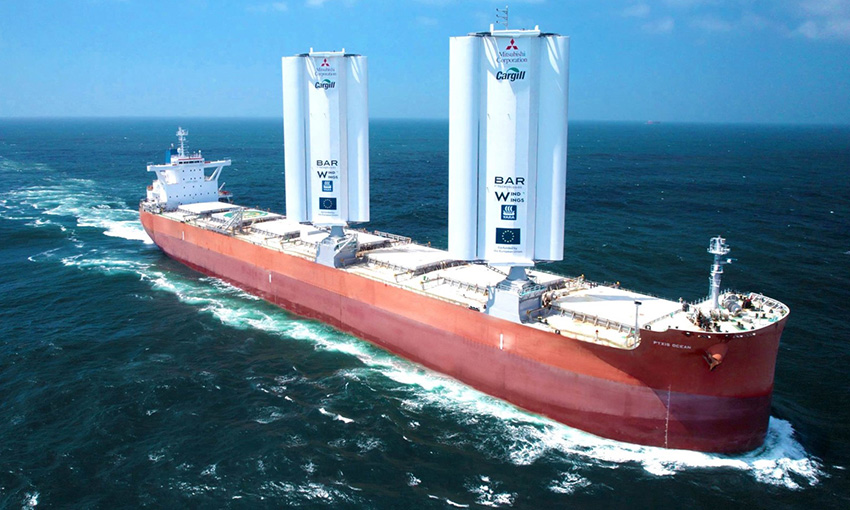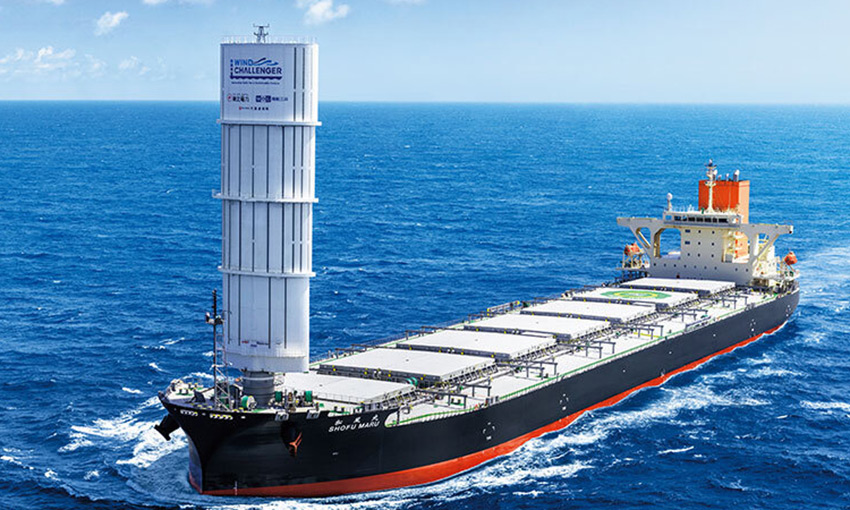GLOBAL commodity group Cargill has reported positive fuel-reduction results from a six-month trial of wind-assisted propulsion (WAP) technology.
Cargill underwrote the equipping of MC Shipping’s Kamsarmax bulker Pyxis Ocean (80, 962 DT, built 2017) with two WindWings® – large solid wind sails developed by the UK’s BAR Technologies – and says it has achieved performance consistent with what was predicted, which is equivalent to an average saving of 3 tonnes of fuel per day.
The chartered ship was retrofitted with two WindWings, which measure 37.5 meters in height and resemble large airplane wings, at a COSCO shipyard in Shanghai. The wings are installed vertically to catch the wind and propel the ship forward, allowing the ship’s engine to be ‘turned down so that the ship can travel at the same speed as a conventional ship using less fuel. The wings are controlled by a touch panel on the bridge. A simple traffic light system tells the crew when to raise or lower the sails. Once raised, the operation is fully automated: sensors onboard constantly measure the wind, and the sails self-adjust to the optimal configuration.
Following modification the Singapore-flagged Pyxis Ocean began trading in August 2023 and during the first six months of testing it has sailed the Indian Ocean, Pacific Ocean, North and South Atlantic, and passed Cape Horn and the Cape of Good Hope.
“We are encouraged by the results and have learned a great deal about implementing wind assisted propulsion on dry bulk vessels,” said Jan Dieleman, president of Cargill’s Ocean Transportation business. “We are on the leading edge of change in the shipping industry and believe technologies that harness the wind could be an important, cost-effective way to achieve our decarbonization goals in the short, medium and long-term.”
John Cooper, BAR Technologies CEO added, “The results of Pyxis Ocean’s first voyages with WindWings installed clearly demonstrate that wind assisted propulsion can secure significant fuel savings and emissions reduction. For example, in near optimum sailing conditions, during an open sea voyage, Pyxis Ocean achieved fuel savings of 11 tonnes per day.
“And while Pyxis Ocean has two WindWings, we anticipate the majority of Kamsarmax vessels will carry three wings, further increasing the fuel savings and emissions reductions by a factor of 1.5. With Cargill are now able to validate our performance predictions and modelling in real-world conditions, it’s an exciting time as we begin to roll out WindWings production globally.”
Mr Dieleman said Cargill had engaged with more than 250 ports to find ways of enabling vessel with large scale WAP to berth. “This complexity is where Cargill truly excels, and how we can leverage our unique role in the maritime industry. We are not afraid to be a development partner and invest, share risks with partners, and to make a difference in transforming the industry.”
Cargill Ocean Transportation charters around 650 vessels worldwide at any one time.





